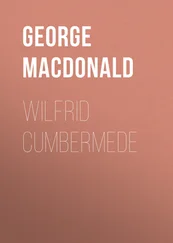George MacDonald - Warlock o' Glenwarlock - A Homely Romance
Здесь есть возможность читать онлайн «George MacDonald - Warlock o' Glenwarlock - A Homely Romance» — ознакомительный отрывок электронной книги совершенно бесплатно, а после прочтения отрывка купить полную версию. В некоторых случаях можно слушать аудио, скачать через торрент в формате fb2 и присутствует краткое содержание. Издательство: Иностранный паблик, Жанр: foreign_prose, foreign_religion, foreign_antique, на английском языке. Описание произведения, (предисловие) а так же отзывы посетителей доступны на портале библиотеки ЛибКат.
- Название:Warlock o' Glenwarlock: A Homely Romance
- Автор:
- Издательство:Иностранный паблик
- Жанр:
- Год:неизвестен
- ISBN:нет данных
- Рейтинг книги:3 / 5. Голосов: 1
-
Избранное:Добавить в избранное
- Отзывы:
-
Ваша оценка:
- 60
- 1
- 2
- 3
- 4
- 5
Warlock o' Glenwarlock: A Homely Romance: краткое содержание, описание и аннотация
Предлагаем к чтению аннотацию, описание, краткое содержание или предисловие (зависит от того, что написал сам автор книги «Warlock o' Glenwarlock: A Homely Romance»). Если вы не нашли необходимую информацию о книге — напишите в комментариях, мы постараемся отыскать её.
Warlock o' Glenwarlock: A Homely Romance — читать онлайн ознакомительный отрывок
Ниже представлен текст книги, разбитый по страницам. Система сохранения места последней прочитанной страницы, позволяет с удобством читать онлайн бесплатно книгу «Warlock o' Glenwarlock: A Homely Romance», без необходимости каждый раз заново искать на чём Вы остановились. Поставьте закладку, и сможете в любой момент перейти на страницу, на которой закончили чтение.
Интервал:
Закладка:
"Gang back, noo, Aggie," said Cosmo again. "What's the guid o' twa whaur ane only need be, an' baith hae to fecht for themsel's?"
"I'm no gaein' back yet," persisted Aggie. "Twa's better at onything nor ane himblane. The sutor's wife's gaein' in to see Grannie, an' Grannie 'll like her cracks a heap better nor mine. She thinks I hae nae mair brains nor a hen,'cause I canna min' upo' things at war nearhan' forgotten or I was born."
Cosmo desisted from useless persuasion, and they struggled on together, through the snow above and the snow beneath. At this Aggie was more than a match for Cosmo. Lighter and smaller, and perhaps with larger lungs in proportion, she bored her way through the blast better than he, and the moment he began to expostulate, would increase the distance between them, and go on in front where he knew she could not hear a word he said.
At last, being then a little ahead, she turned her back to the wind, and waited for him to come up.
"Noo, ye've had eneuch o' 't!" he said. "An' I maun turn an' gang back wi' you, or ye'll never win hame."
Aggie broke into a loud laugh that rang like music through the storm.
"A likly thing!" she cried; "an' me wi' my back a' the ro'd to the win'! Gang back yersel', Cosmo, an' sit by Grannie's fire, an' I'll gang on to the castle, an' lat them ken whaur ye are. Gien ye dinna that, I tell ye ance for a', I'm no gaein' to lea' ye till I see ye safe inside yer ain wa's."
"But Aggie," reasoned Cosmo, with yet greater earnestness, "what'll ye gar fowk think o' me,'at wad hae a lassie to gang hame wi' me, for fear the win' micht blaw me intil the sea? Ye'll bring me to shame, Aggie."
"A lassie! say ye?" cried Aggie,—"I think I hear ye!—an' me auld eneuch to be yer mither! Is' tak guid care there s' be nae affront intil 't. Haud yer hert quaiet, Cosmo; ye'll hae need o' a' yer breath afore ye win to yer ain fireside."
As she spoke, the wind pounced upon them with a fiercer gust than any that had preceded. Instinctively they grasped each other, as if from the wish, if they should be blown away, to be blown away together.
"Eh, that's a rouch ane!" said Cosmo, and again Aggie laughed merrily.
While they stood thus, with their backs to the wind, the moon rose. Far indeed from being visible, she yet shed a little glimmer of light over the plain, revealing a world as wild as ever the frozen north outspread—as wild as ever poet's despairing vision of desolation. I see it! I see it! but how shall I make my reader see it with me? It was ghastly. The only similitude of life was the perplexed and multitudinous motion of the drifting, falling flakes. No shape was to be seen, no sound but that of the wind to be heard. It was like the dream of a delirious child after reading the ancient theory of the existence of the world by the rushing together of fortuitous atoms. Wan and thick, tumultuous, innumerable to millions of angels, an interminable tempest of intermingling and indistinguishable vortices, it stretched on and on, a boundless hell of cold and shapelessness—white thinned with gray, and fading into gray blackness, into tangible darkness.
The moment the fury of the blast abated, Agnes turned, and without a word, began again her boring march, forcing her way through the palpable obstructions of wind and snow. Unable to prevent her, Cosmo followed. But he comforted himself with the thought, that, if the storm continued he would get his father to use his authority against her attempting a return before the morning. The sutor's wife was one of Grannie's best cronies, and there was no fear of her being deserted through the night.
Aggie kept the lead she had taken, till there could be no more question of going on, and they were now drawing near the road that struck off to the left, along the bank of the Warlock river, leading up among the vallies and low hills, most of which had once been the property of the house of Warlock, when she stopped suddenly, this time without turning her back to the wind, and Cosmo was immediately beside her.
"What's yon, Cosmo?" she said—and Cosmo fancied consternation in the tone. He looked sharply forward, and saw what seemed a glimmer, but might be only something whiter in the whiteness. No! it was certainly a light—but whether on the road he could not tell. There was no house in that direction! It moved!—yet not as if carried in human hand! Now it was gone! There it was again! There were two of them—two huge pale eyes, rolling from side to side. Grannie's warning about the Prince of the power of the air, darted into Cosmo's mind. It was awful! But anyhow the devil was not to be run from! That was the easiest measure, no doubt, yet not the less the one impossible to take. And now it was plain that the something was not away on the moor, but on the road in front of them, and coming towards them. It came nearer and nearer, and grew vaguely visible—a huge blundering mass—animal or what, they could not tell, but on the wind came sounds that might be human—or animal human—the sounds of encouragement and incitation to horses. And now it approached no more. With common impulse they hastened towards it.
It was a travelling carriage—a rare sight in those parts at any time, and rarer still in winter. Both of them had certainly seen one before, but as certainly, never a pair of lighted carriage-lamps, with reflectors to make of them fiendish eyes. It had but two horses, and, do what the driver could, which was not much, they persisted in standing stock-still, refusing to take a single step farther. Indeed they could not. They had tried and tried, and done their best, but finding themselves unable to move the carriage an inch, preferred standing still to spending themselves in vain struggles, for all their eight legs went slipping about under them.
Cosmo looked up to the box. The driver was little more than a boy, and nearly dead with cold. Already Aggie had a forefoot of the near horse in her hand. Cosmo ran to the other.
"Their feet's fu' o' snaw," said Aggie.
"Ay; it's ba'd hard," said Cosmo. "They maun hae come ower a saft place: it wadna ba' the nicht upo' the muir."
"Hae ye yer knife, Cosmo?" asked Aggie.
Here a head was put out of the carriage-window. It was that of a lady in a swansdown travelling-hood. She had heard an unintelligible conversation—and one intelligible word. They must be robbers! How else should they want a knife in a snowstorm? Why else should they have stopped the carriage? She gave a little cry of alarm. Aggie dropped the hoof she held, and went to the window.
"What's yer wull, mem?" she asked.
"What's the matter?" the lady returned in a trembling voice, but not a little reassured at the sight, as she crossed the range of one of the lamps, of the face of a young girl. "Why doesn't the coachman go on?"
"He canna, mem. The horse canna win throu the snaw. They hae ba's o' 't i' their feet, an' they canna get a grip wi' them, nae mair nor ye cud yersel', mem, gien the soles o' yer shune war roon' an' made o'ice. But we'll sune set that richt.—Hoo far hae ye come, mem, gien I may speir? Aigh, mem, its an unco nicht!"
The lady did not understand much of what Aggie said, for she was English, returning from her first visit to Scotland, but, half guessing at her question, replied, that they had come from Cairntod, and were going on to Howglen. She told her also, now entirely reassured by Aggie's voice, that they had been much longer on the way than they had expected, and were now getting anxious.
"I doobt sair gien ye'll win to Howglen the nicht," said Aggie.– "But ye're not yer lone? "she added, trying to summon her English, of which she had plenty of a sort, though not always at hand.
"My father is with me," said the lady, looking back into the dark carriage, "but I think he is asleep, and I don't want to wake him while we are standing still."
Читать дальшеИнтервал:
Закладка:
Похожие книги на «Warlock o' Glenwarlock: A Homely Romance»
Представляем Вашему вниманию похожие книги на «Warlock o' Glenwarlock: A Homely Romance» списком для выбора. Мы отобрали схожую по названию и смыслу литературу в надежде предоставить читателям больше вариантов отыскать новые, интересные, ещё непрочитанные произведения.
Обсуждение, отзывы о книге «Warlock o' Glenwarlock: A Homely Romance» и просто собственные мнения читателей. Оставьте ваши комментарии, напишите, что Вы думаете о произведении, его смысле или главных героях. Укажите что конкретно понравилось, а что нет, и почему Вы так считаете.












